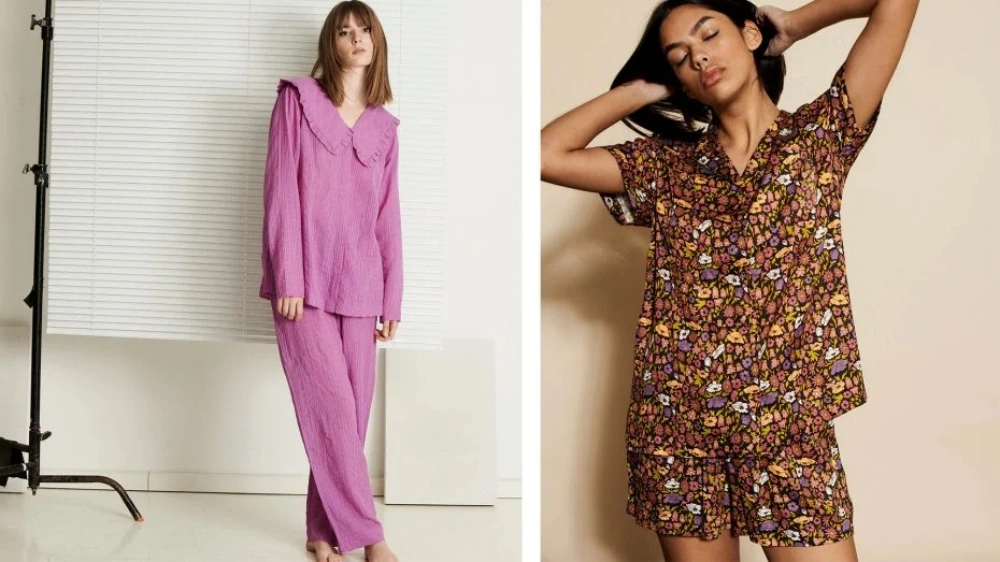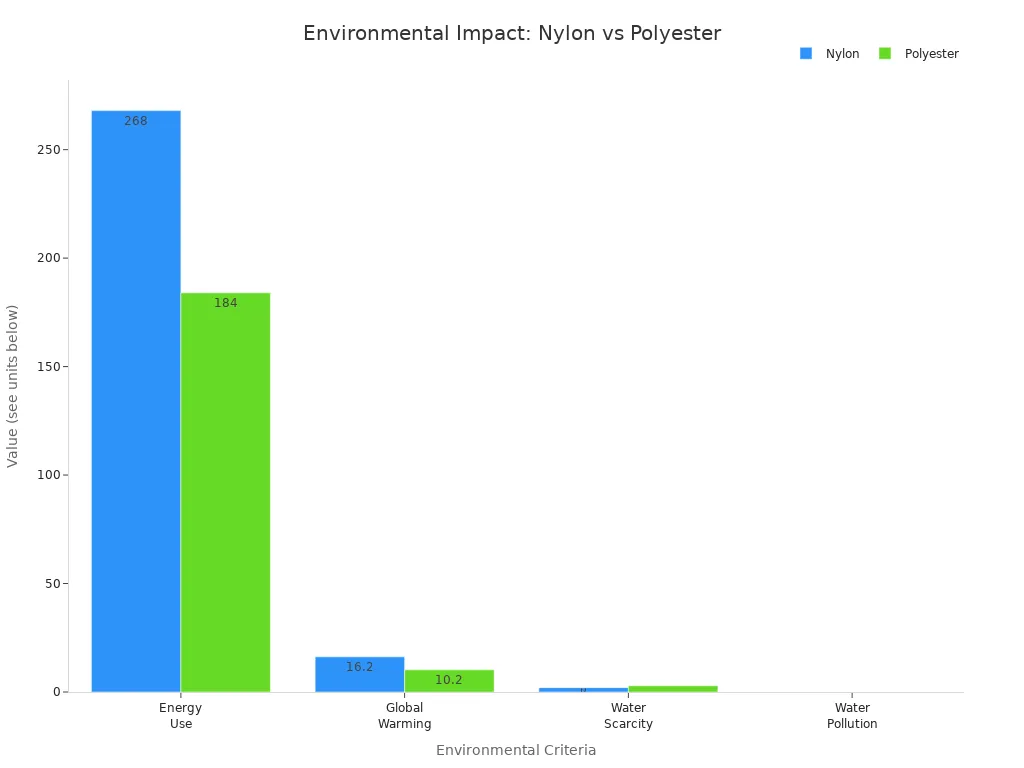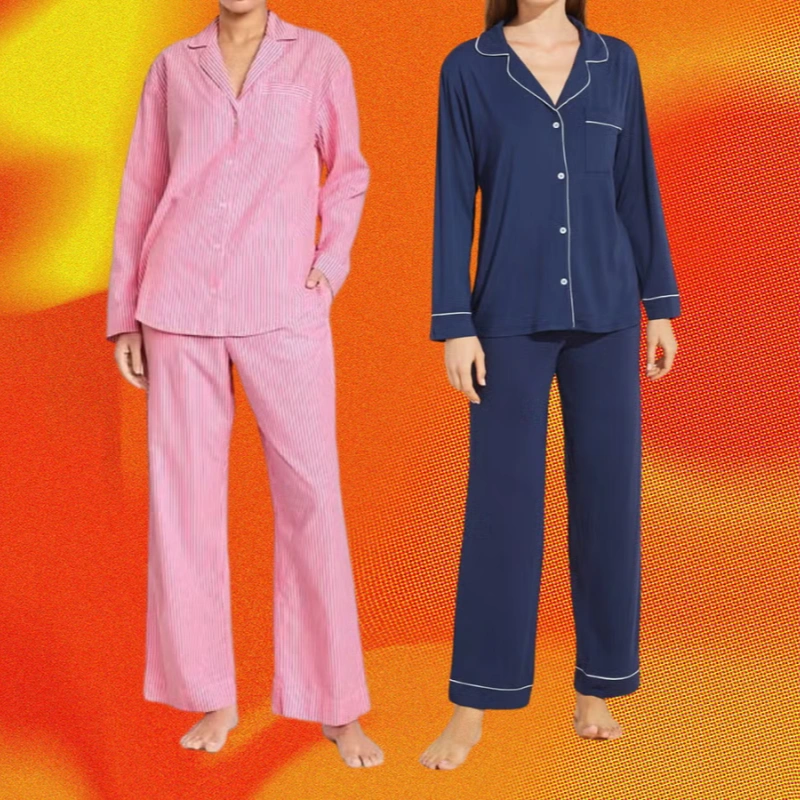If you’re deciding between nylon vs polyester for pajamas, nylon often feels softer and stays cooler, especially when blended for added comfort. Nylon pajamas provide a silky, cool-to-the-touch sensation and manage moisture effectively, helping you sleep comfortably through the night.
Polyester pajamas, meanwhile, are favored for their durability and easy maintenance. Although polyester is lightweight, it tends to trap more heat compared to nylon.
Friendtex offers both nylon and polyester clothing options, allowing you to choose the fabric that best fits your needs. Selecting the right material is key to ensuring a restful night’s sleep.
Key Takeaways
Nylon pajamas feel soft, silky, and stretch with your movements, making them great for comfort and flexibility during sleep.
Polyester pajamas dry quickly, resist wrinkles, and keep their color, offering easy care and durability at a lower price.
Both fabrics manage moisture differently: nylon absorbs some sweat for a soft feel, while polyester wicks moisture away to keep you dry.
Proper care with low heat washing and drying helps both nylon and polyester pajamas last longer and stay comfortable.
Choosing between nylon and polyester depends on your priorities like softness, breathability, cost, and environmental impact.
Differences and Similarities
When you look at nylon vs polyester for pajamas, you’ll notice some clear differences and similarities. Both fabrics come from synthetic origins, but their fiber structure and properties set them apart. Here’s a quick side-by-side comparison to help you see the key differences:
Quick Comparison Table
Aspect | Nylon (Polyamide) | Polyester |
|---|---|---|
Chemical Composition | Polyamide from adipic acid and hexamethylenediamine | Polyester polymer from glycol and terephthalic acid |
Fiber Structure | Hydrophilic, absorbs moisture | Crystalline, hydrophobic |
Softness & Texture | Silky, smooth, lightweight, luxurious feel | Soft, comfortable, but less flexible |
Durability | Strong, elastic, resists abrasion and chemicals | Durable, resists UV, water, and heat |
Moisture Management | Absorbs more moisture, dries slower | Repels water, wicks moisture, and dries quickly |
Color Fastness | It may fade over time | Excellent color retention |
Typical Uses | Pajamas, hosiery, activewear, and sportswear | Pajamas, outdoor gear, upholstery |
Key Features
You’ll find that nylon pajamas feel soft and silky against your skin. The polyamide fibers give them a luxurious touch and great elasticity, so they move with you as you sleep.
Nylon also stands out for its strength and flexibility, making it a favorite for both sleepwear and activewear, and sportswear. However, nylon absorbs more moisture and dries a bit slower, which can affect how cool you feel at night.
Polyester pajamas, on the other hand, use a different synthetic structure. The polyester fibers are hydrophobic, so they repel water and wick moisture away from your skin. This property helps you stay dry and comfortable.
Polyester also resists wrinkles, UV rays, and mildew, so your pajamas keep their shape and color even after many washes. You’ll notice that polyester feels soft, but it’s usually less stretchy than nylon.
Both nylon and polyester offer unique properties that make them popular for pajamas. The differences and similarities between these fabrics come down to their fiber structure, moisture management, and durability.
Friendtex has mastered the art of working with both polyamide and polyester, delivering pajamas that combine comfort, style, and long-lasting quality. No matter which fabric you choose, you can trust Friendtex’s expertise to provide sleepwear that meets your needs for softness, durability, and easy care.
If you want pajamas that feel silky and flexible, nylon is a great pick. If you prefer something that dries quickly and holds its color, polyester might be your best bet. Each fabric brings its own strengths to your nighttime routine, so think about what matters most to you.
Comfort and Feel

Softness and Texture
When you slip into pajamas, you want them to feel soft and gentle on your skin. Nylon pajamas give you a silky, smooth touch that feels almost luxurious. The fabric glides over your skin and stretches with your movements, which is great if you toss and turn at night.
Many people love nylon clothing for its flexibility and forgiving fit. Polyester pajamas also feel soft, but the texture is a bit different. Polyester clothing tends to be less stretchy, but it still feels comfortable and cozy. You might notice that polyester pajamas keep their shape well and resist wrinkles, which adds to their appeal.
Breathability
Breathability is a big deal when it comes to sleepwear. You want pajamas that let your skin breathe and help you stay cool. Scientific studies show that both nylon and polyester have unique properties that affect air flow.
Polyester is naturally hydrophobic, so it repels water and can sometimes trap heat. Nylon usually offers medium breathability, especially when the fabric is tightly woven. The structure and weave of the fabric play a big role in how much air passes through.
Here’s a quick look at how these fabrics compare in terms of air permeability:
Fabric Type | Air Permeability Range (L/m²/s) |
|---|---|
Polyester | Approximately 50 – 200 |
Nylon | Typically medium permeability |
If you want pajamas that feel cooler, you might prefer nylon, especially if you choose a lighter weave. Polyester clothing works well if you like a cozy, warm feel, especially in cooler weather.
Friendtex Pajama Experience
With Friendtex, you get pajamas made from high-quality nylon and polyester. Customers often mention that polyester clothing is affordable, soft, and easy to care for, making it a solid choice for everyday sleepwear.
Nylon pajamas from Friendtex stand out for their smooth texture and flexibility, which many people find comfortable if they move a lot during sleep. Both options offer great durability and keep their softness after many washes.
If you want pajamas that combine comfort, style, and easy care, Friendtex has you covered with both nylon and polyester choices.
Moisture and Breathability
Sweat Management
When you sleep, you want pajamas that help manage sweat and keep you dry. Both nylon and polyester do a good job here, but they work in slightly different ways. Nylon has a smooth surface and offers good absorption, so it can pull some moisture away from your skin.
Polyester, on the other hand, is known for its low moisture absorption. This means it does not soak up sweat but instead moves it to the surface, where it can evaporate.
Here’s a quick look at how these fabrics handle sweat:
Nylon provides moderate absorption, which helps if you sweat a little at night.
Polyester stands out for its low moisture absorption, so it dries quickly and feels less damp.
Both fabrics can wick moisture, especially if blended or specially treated.
The way the fabric is woven or finished can make a big difference in how well it manages sweat.
If you want pajamas that keep you feeling dry, you might like polyester for its quick-drying nature. Nylon also helps, especially if you prefer a bit more absorption and a softer feel.
Nighttime Comfort
Nighttime comfort depends on how well your pajamas handle breathability and moisture management. Nylon feels cool and smooth, which can help you stay comfortable if you tend to get warm.
Its absorption ability means it can handle light sweat without feeling sticky. Polyester, with its low moisture absorption, keeps sweat off your skin and dries fast, so you wake up feeling fresh.
Let’s compare the two in a simple table:
Feature | Nylon | Polyester |
|---|---|---|
Absorption | Moderate | Very low |
Low Moisture Absorption | Sometimes | Always |
Drying Speed | Fast | Very fast |
Breathability | Good | Good |
You get great comfort from both fabrics, but your choice depends on what you value more—absorption or low moisture absorption. If you want pajamas that feel silky and handle a bit of sweat, nylon is a solid pick. If you want to stay dry all night, polyester might be your best friend.
Tip: For the best sleep, look for pajamas that balance breathability and moisture management. Friendtex offers both nylon and polyester options, so you can choose what suits your sleep style.
Durability and Care
Washing and Maintenance
Taking care of your pajamas helps them last longer and keeps them looking fresh. Both nylon and polyester pajamas are easy to care for, but you need to follow a few simple steps to protect their strength and durability.
Wash nylon pajamas in warm or cold water. Hot water can damage the fibers and reduce their high tensile strength.
Use regular detergent, but skip chlorine bleach. Bleach can weaken nylon and polyester fibers.
Hand-washing nylon is best for high durability, but you can use a washing machine if you place the pajamas in a mesh bag.
Dry nylon pajamas by air drying in the shade or tumble drying on low heat. High heat can harm the fiber’s strength and durability.
Use iron nylon on the lowest heat setting and avoid steam.
Polyester pajamas do well in a normal wash cycle with warm water.
Tumble dry polyester on a low or cool setting. This keeps the fabric’s strength and shape.
Avoid direct sunlight when drying polyester to prevent fading.
Use gentle detergents made for synthetic fabrics.
Air drying polyester helps keep its high tensile strength and extends its life.
Tip: Both nylon and polyester are sensitive to heat. Always use low temperatures when washing or drying to keep your pajamas in top shape.
Longevity
You want pajamas that stay soft, strong, and good-looking after many washes. Nylon pajamas stand out for their smooth surface and high durability. They resist wear and pilling, so you won’t see much lint or fuzz even after lots of use.
This makes nylon a great choice if you want pajamas that keep their strength and look new for a long time.
Polyester pajamas also offer impressive durability. They resist wrinkles and color fading, which means your pajamas stay bright and neat. Polyester has high tensile strength, so it holds up well to daily wear.
However, polyester can pill in areas that rub together, like the sides or underarms. Washing polyester inside out, using low temperatures, and drying flat can help reduce pilling and keep the fabric looking smooth.
Both nylon and polyester give you pajamas with strength and durability. If you want less pilling and a smoother feel, nylon is a smart pick. If you care about color staying bright and easy care, polyester is a solid choice. With the right care, you can enjoy high durability and comfort from both fabrics for years.
Cost and Value
Price Points
When you shop for pajamas, price often plays a big role in your decision. Nylon and polyester pajamas come at different price points, and knowing what to expect can help you make a smart choice. Here’s a quick look at the typical price ranges you’ll find in stores:
Material | Price Range Description | Notes on Nylon Pajamas |
|---|---|---|
Polyester | Basic: $15 – $40 | Nylon pajamas are not specifically priced |
Mid-range: Around $80 | Nylon is often found in blends with rayon/spandex | |
Designer: $100 or more | Stretchy nylon blends can be pricey |
Polyester pajamas usually cost less than nylon ones. You’ll see basic polyester sets starting as low as $15, while mid-range options hover around $80. Designer polyester pajamas can go over $100.
Nylon pajamas, especially those blended with rayon or spandex, tend to cost more. You might notice that stretchy blends with nylon often sit at the higher end of the price spectrum.
Why does nylon cost more? The answer comes down to how each fabric is made:
Polyester is much cheaper to produce than nylon.
Nylon uses more expensive raw materials like petroleum and natural gas.
Making nylon requires high pressure and temperature, which adds to the cost.
Polyester production is simpler and uses less expensive inputs.
So, if you want a budget-friendly option, polyester pajamas are a great pick. If you’re looking for a more luxurious feel and don’t mind spending a bit more, nylon pajamas might be worth it.
Friendtex Pajama Value
You want pajamas that offer more than just a good price. Friendtex delivers real value by focusing on quality, comfort, and customization. Here’s what you get when you choose Friendtex pajamas:
Feature Category | Friendtex Offerings |
|---|---|
Quality Control | Strict inspections, advanced technology, and careful material selection |
Certifications | GOTS, OEKO-TEX®, SEDEX, and more for safety and sustainability |
Sustainability | Eco-friendly polyester options and responsible manufacturing |
Fabric Properties | Soft, lightweight, smooth, wrinkle-resistant, moisture-wicking, and durable |
Comfort Enhancements | Blends with cotton or spandex for extra breathability and stretch |
Care & Maintenance | Easy to wash, keeps its shape and color after many washes |
Travel Suitability | Wrinkle resistance and quick drying make them perfect for packing |
Customization Options | Choose your own logos, colors, patterns, sizes, and styles |
Target Audiences | Options for men, women, and kids |
With Friendtex, you get more than just pajamas—you get comfort, style, and peace of mind. Whether you pick nylon or polyester, you know you’re getting high-quality sleepwear that fits your needs and your budget.
Health and Sensitivity
Skin Reactions
When you pick pajamas, you want them to feel good on your skin. Some people notice that synthetic fabrics like nylon and polyester can sometimes cause skin irritation. This usually happens if you have sensitive skin or certain skin conditions. Here’s what you might experience:
Itching or redness after wearing new pajamas
Small bumps or rashes, especially if you sweat at night
Skin feeling hot or tender in areas where the fabric touches
Nylon absorbs sweat poorly, which can lead to clogged sweat glands and itchy bumps. Polyester is more likely to cause irritant contact dermatitis, a type of skin inflammation that shows up soon after you put on the fabric.
Both fabrics can trap heat and moisture, which sometimes makes irritation worse, especially if you wear tight pajamas or sleep in a warm room.
Studies show that chemicals used in making nylon and polyester, like dyes or finishing agents, can stay in the fabric. These chemicals may cause irritation or even allergic reactions in some people. Washing new pajamas before you wear them can help remove some of these chemicals.
If you have sensitive skin, try to choose loose-fitting pajamas and keep your skin clean and dry.
Allergy Considerations
Allergic reactions to nylon and polyester are not very common, but they do happen. Most of the time, the problem comes from the chemicals, dyes, or resins used during manufacturing, not the fibers themselves. Here are some things to watch for:
Rashes, itching, or swelling after wearing synthetic pajamas
Hives or skin tenderness, especially in areas that sweat a lot
More irritation if you already have eczema or another skin condition
Synthetic fabrics like polyester and nylon are more likely to cause textile dermatitis than natural fibers. This is because they don’t breathe as well, which can lead to more sweating and irritation. If you notice a reaction, it’s best to switch to a different fabric and talk to your doctor if symptoms don’t go away.
Tip: Always wash new pajamas before wearing them, and look for options labeled as hypoallergenic or free from harsh dyes.
Environmental Impact

Sustainability
When you think about pajamas, you might not realize how much the fabric choice affects the planet. Nylon and polyester both come from oil, so they are not renewable.
Both fabrics are non-biodegradable, which means they can stay in landfills for hundreds of years. Every time you wash pajamas made from these materials, tiny microplastics can enter the water and harm the environment.
Let’s look at some key environmental factors:
Environmental Aspect | Polyester | Nylon |
|---|---|---|
Energy Use | High (about 125 MJ/kg) | High (needs lots of heat and power) |
CO2 Emissions | 9.5–14.2 kg per kg | About 20 kg per kg (includes gases worse than CO2) |
Water Usage | Used for cooling and cleaning | High, especially for dyeing |
Microplastic Release | Yes | Yes |
Biodegradable? | No | No |
Recyclability | Yes, with strong systems | Possible, but less common |
Polyester has a more developed recycling system. You can even find pajamas made from 100% recycled polyester. Nylon recycling exists, but it is less common, and the quality can drop after each cycle.
Both fabrics have a big impact on the environment, but polyester usually has lower CO2 emissions and energy use than nylon. Textile recycling helps, but it is not perfect.
If you care about sustainability considerations, look for recycled options and wash your pajamas less often to reduce microplastic pollution.
Friendtex Commitment
You want to choose pajamas that feel good and do good. Friendtex takes environmental factors seriously. The company uses eco-friendly polyester and works to improve recyclability and sustainability in every step of production.
Friendtex holds certifications that show a real commitment to sustainability, like GOTS and OEKO-TEX®. The team also explores new ways to support textile recycling and reduce the environmental impacts of nylon and polyester.
Friendtex believes in making high-quality pajamas that last longer, so you buy less and waste less. The company also offers recycled polyester options, helping you make a better choice for the planet.
When you pick Friendtex, you support a brand that values sustainability and works hard to protect the environment for future generations.
Nylon vs Polyester: Which to Choose?
Best for Pajamas
Choosing between nylon vs polyester for pajamas can feel tricky, but it gets easier when you break down what matters most to you. If you want pajamas that feel soft, smooth, and almost silky, nylon stands out. It glides over your skin and stretches with your movements, which makes it great for tossing and turning at night.
Polyester, on the other hand, is known for being lightweight, quick-drying, and easy to care for. You can toss polyester pajamas in the wash, and they come out looking fresh every time.
Let’s look at a side-by-side comparison to help you decide:
Criteria | Nylon | Polyester |
|---|---|---|
Strength & Durability | Strong, elastic, resists abrasion | Durable, resists stretching, shrinking, and wrinkling |
Moisture Management | Absorbs more moisture, dries slower | Hydrophobic, wicks moisture away, dries quickly |
Breathability | Less breathable, can trap heat | More breathable, better airflow |
Softness | Softer, smoother feel, comfortable for close skin contact | It can be rougher, but blends enhance softness |
Heat & UV Resistance | Less heat resistant, more prone to UV damage | More heat resistant, better UV resistance |
Cost | More expensive | More budget-friendly |
Environmental Impact | More energy-intensive, less recycled | Lower energy use, more recycled, but both shed microplastics |
You can see that both fabrics have their strengths. Nylon feels softer and more luxurious, while polyester offers better breathability and is easier on your wallet. If you want pajamas that last and keep their shape, both options deliver, but polyester might edge out nylon for easy care and maintenance.

Tip: If you care about the environment, polyester usually has a lower impact and is more likely to be recycled.
When to Pick Nylon?
You should pick nylon pajamas if you love a silky, smooth feel against your skin. Nylon is perfect for people who want sleepwear that moves with them and feels light and luxurious.
The fabric’s strength and elasticity mean your pajamas will hold up well, even if you wear them every night. Nylon also works well if you want pajamas that look polished and resist pilling.
Here are some ideal use cases for nylon pajamas:
You want a soft, close-to-skin feel.
You move a lot in your sleep and need to stretch.
You prefer pajamas that look sleek and shiny.
You want something that resists wear and tear.
Nylon’s strength makes it a great choice for anyone who values both comfort and long-lasting quality. If you have sensitive skin, you might also enjoy the smoothness of nylon, especially if you choose pajamas from Friendtex, where you can customize the fit, color, and style to match your needs.
When to Pick Polyester?
Polyester pajamas shine when you want something that’s easy to care for and keeps you dry. The fabric wicks moisture away from your skin, so you stay comfortable all night.
Polyester is also lightweight and dries quickly, which is perfect if you wash your pajamas often or need them to dry fast. If you’re looking for pajamas that hold their color and shape after many washes, polyester is a smart pick.
You might want to choose polyester if:
You need pajamas that are budget-friendly.
You want something that dries quickly and resists wrinkles.
You prefer lightweight sleepwear for warmer nights.
You want pajamas that are easy to wash and maintain.
Polyester’s strength and resistance to stretching and shrinking make it a favorite for busy lifestyles. Friendtex offers polyester pajamas in a range of styles, including blends with cotton or spandex for extra softness and breathability. You can also customize your pajamas with your favorite colors, patterns, or even your own logo.
Note: Some people with very sensitive skin may find polyester less comfortable, so look for blends or special finishes that boost softness and airflow.
Nylon vs Polyester: Which Should You Choose?
If you want pajamas that feel silky, stretch with you, and offer a touch of luxury, nylon is your best bet. If you care more about easy care, quick drying, and a lower price, polyester is the way to go. Both fabrics offer impressive strength and comfort, so your final choice comes down to what feels best for you.
Friendtex makes it easy to get exactly what you want. You can pick from a wide range of nylon and polyester pajamas, and even customize the design, size, and features. Whether you want something classic or bold, you’ll find pajamas that fit your style and needs.
Remember: There’s no single “best” answer in the nylon vs polyester debate. Your perfect pajamas depend on your personal preferences, sleep habits, and what you value most—whether that’s softness, strength, breathability, or easy care.
Conclusion
Choosing between nylon and polyester pajamas comes down to what you value most. Nylon gives you extra strength and stretch, while polyester stands out for its stain resistance, vibrant colors, and easy care.
Polyester pajamas feel soft, dry quickly, and keep their shape.
Modern polyester blends offer great breathability and comfort for sleep.
Friendtex offers both options in high quality. Think about what matters most to you—comfort, care, or style—and you’ll find the perfect fit for your nights.
FAQ
What makes nylon pajamas feel so soft?
Nylon pajamas feel soft because the fibers are smooth and lightweight. You’ll notice a silky texture that glides over your skin. This makes them a great choice if you want pajamas that feel gentle and luxurious.
Are polyester pajamas good for hot sleepers?
Yes, polyester pajamas work well for hot sleepers. The fabric wicks moisture away from your skin and dries quickly. You’ll stay cool and comfortable, especially if you pick a lightweight or blended style.
How do I care for my nylon or polyester pajamas?
You can machine wash both nylon and polyester pajamas in cold or warm water. Use a gentle detergent. Tumble dry on low or air dry. Avoid high heat to keep your pajamas looking and feeling their best.
Can I customize Friendtex pajamas for my brand?
Absolutely! Friendtex lets you choose colors, patterns, and even add your logo. You can create pajamas that match your brand’s style. Customization is easy and helps your products stand out.
Which fabric lasts longer: nylon or polyester?
Both fabrics offer great durability. Polyester resists wrinkles and fading, while nylon stands up to wear and tear. If you care for them properly, you’ll enjoy long-lasting pajamas no matter which fabric you choose.


